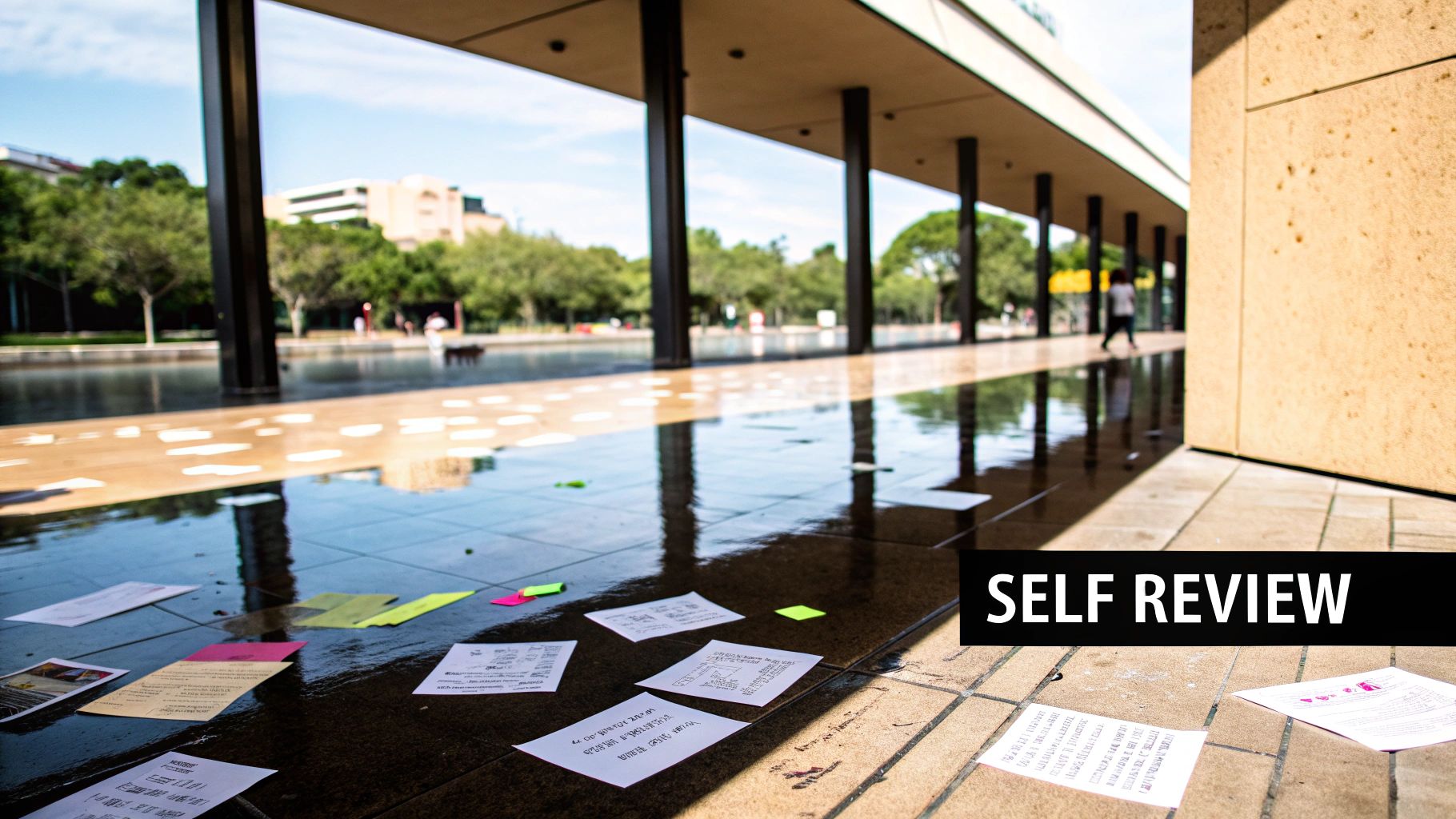
Personal Development Plan Example: Boost Your Career
Crafting Your First Personal Development Plan

Creating a personal development plan (PDP) might seem intimidating, but it's an essential tool for reaching your career goals. Unlike simply setting generic goals, a well-defined PDP provides a structured roadmap for professional growth. This is particularly relevant in the dynamic business landscape of the UAE. Think of your career path as a journey through the Emirates. Your PDP acts like a GPS, guiding you to your destination and helping you navigate any challenges along the way.
Understanding the Building Blocks of a PDP
A successful PDP begins with a comprehensive self-assessment. This requires honestly evaluating your existing skills, pinpointing areas for improvement, and acknowledging your strengths. Think of it like an architect surveying land before designing a building. They must understand the existing conditions to establish a solid foundation. Similarly, understanding your strengths and weaknesses provides the groundwork for an effective PDP.
Setting clear, measurable goals is also crucial. These objectives should be Specific, Measurable, Achievable, Relevant, and Time-bound (SMART). Instead of a vague goal like “improve communication skills,” a SMART goal would be “confidently present a project proposal to the team within three months.” This clarity facilitates focused effort and accurate progress tracking.
Practical Steps to Get Started
With a clear understanding of your current position and desired destination, you can begin building your plan. This process involves several key steps. First, identify the resources needed to achieve your goals. This could include enrolling in a course at the National Academy, seeking mentorship, or attending workshops relevant to your field.
Next, create a realistic timeline with milestones. Breaking down large goals into smaller, manageable steps fosters a sense of accomplishment and maintains momentum. If your goal is to master a new software program, set milestones for each training module. This structured approach keeps you motivated and on track.
Finally, prioritize support and accountability. Share your PDP with a trusted mentor or colleague who can offer guidance and encouragement. In the UAE, with its focus on relationships and collaboration, utilizing your network can greatly benefit your development. This growing interest in personal development, including coaching and skill enhancement, is reflected in market trends. The Middle East Personal Development Market is expected to grow at a CAGR of 5.17% from 2024 to 2031, reaching USD 2790.43 million. This expansion is fueled by a young population striving for advancement, supportive government initiatives, and a thriving economy, especially within the UAE. Find more detailed statistics here. This upward trajectory underscores the importance of a well-structured PDP for achieving professional success in the region.
The Executive Fast-Track Development Blueprint

Moving beyond basic career planning requires a strategic personal development plan, especially for executives in the UAE. This blueprint focuses on rapidly acquiring the skills needed for career advancement. It's not just about technical skills; it's about cultivating leadership presence in a competitive market.
Identifying High-Visibility Projects
A crucial component of any executive personal development plan is strategically selecting projects. Aim for initiatives with high visibility and a significant organizational impact. These projects offer opportunities to showcase your abilities to key decision-makers.
For example, leading a cross-functional team to implement a new digital strategy demonstrates both leadership and technical skills. This approach provides valuable experience and builds your reputation within the company.
Cultivating Strategic Relationships
Building strong relationships is essential for career advancement in the UAE. Networking with senior leaders, mentors, and industry peers can unlock new opportunities and offer valuable insights.
Actively participate in industry events, join professional organizations, and seek mentorship from experienced professionals. Consider external resources like formal Leadership Development Programs when crafting your plan. These programs offer a structured approach to enhancing leadership capabilities. These connections can provide guidance, support, and advocacy throughout your career journey.
Developing Cross-Cultural Communication
The UAE's diverse business environment demands strong cross-cultural communication skills. Effectively communicating with colleagues and clients from various cultural backgrounds is crucial for success.
This includes understanding cultural nuances, adapting your communication style, and building trust across cultures. Developing cultural sensitivity demonstrates respect and fosters stronger professional relationships, vital in the UAE's international business landscape. This adaptability becomes a valuable asset, improving your ability to lead and collaborate in diverse teams.
Navigating Organizational Politics
Organizational politics are a reality in any corporate setting. Navigating these complexities with integrity is vital for executive success. This involves understanding power dynamics, building alliances, and effectively advocating for your ideas.
Maintain an authentic leadership presence while navigating these challenges. Focus on building genuine relationships and demonstrating your value to the organization. This builds trust and strengthens your leadership reputation. It also reinforces your credibility and influence within the organization.
Understanding Regional Workforce Dynamics
The Middle East and North Africa (MENA) region faces significant workforce challenges. Despite improvements in education, the region only captures 62% of its human capital potential. Youth unemployment rates average 31%, almost five times higher than adult rates. This highlights the importance of personal development plans focused on adaptability and skill enhancement. The World Economic Forum predicts a 50% increase in the MENA region’s tertiary-educated workforce by 2030, emphasizing the role of personal development in bridging the education-employment gap. Explore this topic further: Find more detailed statistics here. This data underscores the need for executives to continuously develop their skills to remain competitive.
The following table provides a framework for executive development, incorporating UAE-specific considerations.
Executive Development Plan Components
| PDP Component | Purpose | UAE-Specific Considerations |
|---|---|---|
| Leadership Development | Enhance leadership skills and presence | Focus on cross-cultural leadership and building relationships within a hierarchical business culture |
| Technical Expertise | Deepen knowledge in your field | Stay current with technologies relevant to the UAE market |
| Networking | Build strategic relationships | Leverage opportunities to connect with influential figures in the UAE business community |
| Communication Skills | Master cross-cultural communication | Develop sensitivity to cultural nuances and adapt your communication style accordingly |
This table offers a sample framework that should be adapted to individual needs and career aspirations within the UAE context. By focusing on these key elements, executives can create a powerful personal development plan that accelerates their career trajectory in the dynamic UAE business environment.
Building the Entrepreneur's Growth Roadmap

The entrepreneurial journey in the UAE presents unique challenges and opportunities. A personal development plan for an entrepreneur operating in this region goes beyond simply acquiring new skills. It requires a strategic approach to developing capabilities tailored to navigating the UAE's dynamic business landscape. This includes honing market intuition to identify promising ventures and cultivating the resilience to overcome inevitable obstacles.
Developing Market Intuition
Success in the UAE market hinges on a deep understanding of its intricacies. Active engagement with the local business community is essential. Attending industry events and conducting thorough market research provide invaluable insights. For instance, attending events like GITEX Global in Dubai offers exposure to emerging trends and valuable networking opportunities. This firsthand engagement fosters a keen awareness of consumer preferences and market dynamics.
Building Resilience
Entrepreneurship is a path fraught with challenges. The ability to rebound from setbacks – resilience – is paramount. Seeking mentorship from seasoned entrepreneurs in the UAE can be invaluable. Joining supportive networks and developing effective stress-management techniques are also beneficial. These strategies empower entrepreneurs to learn from failures, adapt to evolving circumstances, and maintain focus on their long-term vision.
Securing Investment: The Financial Acumen Factor
Financial acumen is critical, particularly when seeking investment in the UAE. A solid grasp of financial statements, investment strategies, and the regional funding landscape is essential. This knowledge enables entrepreneurs to effectively articulate their business plans to potential investors and secure crucial funding. Such preparedness is a significant advantage in a competitive market.
Sequencing Skill Development for Growth
Aligning skill development with the venture's growth stage is vital. In the early stages, technical proficiency and product development often take precedence. As the venture expands, however, leadership skills, team management, and strategic thinking become increasingly crucial. This requires recognizing when to invest in technical upskilling versus cultivating leadership qualities. Joining an accelerator program like in5 can provide targeted support and mentorship tailored to various stages of growth.
Additionally, personalized guidance is highly valued in the UAE. Personal coaching and training hold a significant 40.54% revenue share in the Middle East and Africa's personal development market in 2024. This underscores the importance of mentorship and individualized support in achieving personal and professional objectives. For further insights, explore this resource: Discover more insights. The market's projected 6.5% CAGR from 2025 to 2030 further emphasizes the increasing demand for tailored development plans.
Balancing Operational Demands and Strategic Growth
Entrepreneurs often grapple with balancing immediate operational requirements and long-term strategic goals. A well-defined personal development plan helps address this challenge. It enables entrepreneurs to allocate time for activities that contribute to both immediate needs and future expansion. This balanced approach fosters sustainable success and provides a framework for continuous learning and adaptation in a dynamic business environment. By strategically cultivating these capabilities, entrepreneurs in the UAE can build enduring businesses and contribute to the region's thriving ecosystem.
Designing Your Integrated Work-Life Success Plan

This section shifts the focus from compartmentalized career planning to a personal development plan example that integrates professional success with personal well-being. This holistic approach is especially relevant in the UAE, where cultural expectations around family and availability can significantly impact work-life balance. It's about strategically aligning your career ambitions with personal fulfillment to achieve sustainable success.
Conducting an Honest Energy Audit
The first step toward integration involves understanding where your energy goes. An energy audit requires honestly evaluating how you spend your time and identifying activities that either deplete or invigorate you. This self-awareness is the foundation for creating a balanced schedule that supports both career goals and personal priorities. For example, pinpoint time-wasting meetings or unproductive habits that drain your energy. This assessment highlights areas where you can reclaim valuable time and energy for more fulfilling activities.
Identifying Value-Draining Activities
After identifying your energy drains, the next step is to minimize or eliminate them. These activities might include unproductive tasks at work, excessive social media use, or unhealthy lifestyle choices. This requires making conscious decisions to reduce or remove these activities. This could involve delegating tasks, setting boundaries on screen time, or prioritizing exercise and healthy eating. This conscious energy management is crucial for achieving both professional and personal objectives.
Establishing Boundaries
Setting clear boundaries between your professional and personal life is essential, particularly in the UAE's dynamic business environment. This involves defining clear start and end times for your workday, allocating specific time for family and personal activities, and communicating these boundaries to colleagues and clients. Creating this separation between work and personal time allows you to fully engage in both areas without feeling overwhelmed or pulled in multiple directions.
Navigating Cultural Expectations in the UAE
In the UAE, cultural norms surrounding availability and family obligations can sometimes blur the lines between work and personal life. Both locals and expatriates need to navigate these expectations with sensitivity and understanding. Developing cultural intelligence is key. For example, acknowledging family commitments and religious observances demonstrates respect and strengthens professional relationships. Additionally, social policies in the MENA region often influence personal development. Learn more about these policies here: Explore this topic further.
Implementation Roadmaps for Different Career Stages
The specifics of a work-life integration plan will differ based on your career stage. A junior professional’s plan might prioritize skill development and networking, while a senior executive’s plan might focus on leadership development and mentorship. This means adapting your plan as your career progresses and your priorities change. At National Academy, we offer courses for various career stages, helping professionals in the UAE achieve their career aspirations while maintaining a healthy work-life balance. Visit their website to explore courses tailored to your specific needs and aspirations. This ensures your personal development plan remains relevant and effective in supporting your evolving needs and ambitions.
The Digital Transformation Skills Acceleration Plan
As technology continues to reshape industries across the UAE, digital upskilling has become more important than ever for career advancement. This plan focuses on acquiring in-demand digital competencies, particularly crucial in the UAE's evolving tech sectors. It emphasizes not only learning technical skills but also integrating them with your existing professional knowledge to create a unique and valuable skill set.
Identifying High-Demand Digital Competencies in the UAE
The first step in your digital transformation journey is identifying the most valuable skills in the UAE's current job market. By analyzing the fastest-growing sectors, you can pinpoint key areas for investment. For instance, the rise of Fintech in the UAE has made skills like blockchain development and data analytics highly sought after. Blockchain Council and DataCamp can provide resources. The growth of e-commerce similarly prioritizes expertise in digital marketing and user experience (UX) design.
Focusing on these in-demand skills can position you for success in the competitive UAE market.
Assessing Your Current Digital Proficiency
After identifying key competencies, assess your existing skills. This involves comparing your proficiency to industry benchmarks. Numerous online platforms and professional organizations offer self-assessment tools and resources. This honest self-evaluation is crucial for identifying skill gaps and determining areas needing further development.
Creating Structured Learning Pathways
A successful digital upskilling plan blends formal education and practical application. Structured learning pathways might combine online courses, professional certifications, and hands-on projects. Institutions like the National Academy offer programs tailored to the UAE market. These programs help professionals acquire specialized digital skills in high-demand areas. Combining theory with practical experience makes you job-ready faster.
Combining Technical Skills with Domain Expertise
UAE professionals are increasingly blending technical skills with their domain expertise. For example, a finance professional with Python Python skills can automate complex financial modeling. A healthcare professional with data analysis skills can glean insights from patient data, improving healthcare outcomes. This integration of technical and specialized knowledge makes you a valuable asset.
Showcasing Your Digital Capabilities
Demonstrating your digital skills is key for career advancement. Building a project portfolio, contributing to open-source projects, and participating in online communities effectively showcase your capabilities. Engaging in industry events and networking strengthens your visibility within the UAE's tech ecosystem.
Balancing Immediate Skill Acquisition with Long-Term Adaptability
While acquiring in-demand skills is essential, cultivating long-term adaptability is equally vital. The tech world is constantly evolving. Your development plan should address both current and future skill requirements. Focusing on fundamental concepts, problem-solving, and a growth mindset ensures you stay adaptable.
To help you structure your upskilling journey, we've created a sample timeline:
Digital Skills Development Timeline
| Time Phase | Target Skills | UAE Learning Resources | Assessment Method |
|---|---|---|---|
| Phase 1: 0-3 Months | Foundational Programming (Python) | National Academy, Online Courses | Online coding challenges, small projects |
| Phase 2: 3-6 Months | Data Analysis using Python Libraries | Specialized workshops, DataCamp | Data analysis projects using real-world datasets |
| Phase 3: 6-12 Months | Machine Learning Algorithms | Advanced certifications, Kaggle competitions | Developing and deploying a basic machine learning model |
This timeline breaks the learning process into manageable phases, making it easier to track your progress and ensuring continuous development. Customize it based on your goals and learning pace. By prioritizing digital upskilling through a structured personal development plan, you can position yourself for success in the UAE's dynamic tech environment.
Mastering Cultural Intelligence For Global Success
For professionals navigating the UAE's diverse business landscape, cultural intelligence offers a significant advantage. This section presents a personal development plan example focused on building cross-cultural capabilities for tangible results. We'll draw insights from successful expatriate leaders in the UAE to illustrate practical approaches for thriving in this international hub.
Developing Cultural Adaptability
Adapting to new cultural contexts is fundamental to success in the UAE. This goes beyond simply learning basic customs. It requires developing a mindset of openness and curiosity toward different perspectives. For example, understanding the significance of Ramadan and its impact on business practices demonstrates respect and builds rapport. This adaptability fosters stronger relationships and improved communication across cultures.
Understanding Nuanced Communication Patterns
Communication in the UAE often extends beyond the spoken word. Nonverbal cues, indirect communication styles, and the importance of relationship-building are vital aspects of effective interaction. This involves active listening, observing social dynamics, and adapting your communication approach accordingly. Recognizing the significance of greetings and small talk before discussing business matters, for instance, can significantly enhance communication.
Building Authentic Relationships Across Cultural Differences
The UAE’s business environment thrives on relationships. Building authentic connections across cultural divides is essential for long-term success. This requires genuine interest in understanding others’ perspectives, respecting differences, and investing time in building rapport. Attending cultural events or sharing meals with colleagues from different backgrounds, for instance, can foster stronger professional bonds. This approach facilitates trust and mutual understanding, crucial for successful collaboration.
Translating Cultural Awareness Into Business Advantage
Cultural awareness translates directly into business success. This involves adapting negotiation strategies, leadership styles, and team management techniques to resonate with the UAE's diverse workforce. Understanding the hierarchical nature of many businesses in the region, for example, can inform decision-making and communication strategies. This cultural sensitivity improves collaboration, strengthens team dynamics, and drives positive business outcomes.
Respecting Islamic Business Practices
Respecting Islamic business practices is essential for operating in the UAE. This includes understanding religious observances, adhering to dress code expectations in professional settings, and demonstrating sensitivity to cultural values. Being mindful of prayer times and offering appropriate greetings during Islamic holidays, for example, demonstrates respect and strengthens professional relationships. This understanding contributes to a positive and inclusive work environment.
National Academy offers a range of courses designed to equip professionals with the cultural intelligence needed to thrive in the UAE. Visit their site to explore programs focused on cross-cultural communication, leadership development, and business etiquette specifically tailored for the UAE's dynamic environment.